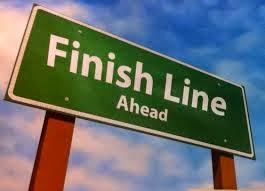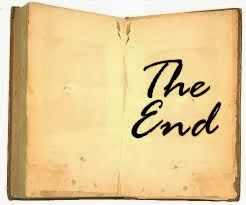As you near the finish line for your Work in Progress, the tendency is to speed things up. You can’t wait to be done and take a break. You’re tired of the story and want to end it already. Or you’re approaching your deadline and have to finish in a hurry.
And yet this is when you need to slow down and let the finale unfold in exquisite detail. Haven’t you watched a TV show that ties up all the loose ends in the final two minutes? How annoyed does that make you feel? As for a book series, fans of Harry Potter felt frustrated by the brief epilogue. They wanted more explanations of what would happen to the characters in life beyond the book. So slow down when you approach completion.
The heroine’s confrontation with the villain should reveal every heartbeat, every pulse-pounding moment of fear. This is when you want time to slow so you can catch every nuance. Yes, the pacing must be quick, but you shouldn’t cheat the reader out of emotional reactions, either during the scene or afterward. And the fight sequence, if there is one, shouldn’t be rushed.
What about when the villain has been defeated? I always like to have a Wrap Scene where quiet reflections on lessons learned, a review of events, and/or a self-revelation occurs. This is where you tie up loose ends and perhaps frame the story with the same people or setting as the opening sequence. Make sure your readers go away with a sense of satisfaction.
Putting some distance between yourself and your work will help you gain perspective. Go back after two weeks, if you have that luxury, and read the ending again. Flesh out any spots that are sparse and be sure you’ve covered all the bases. Your finale will dictate what impression readers take away when they close the book.
Do you tend to race ahead when you’re approaching the finish line?



Timely post. I’m at the end, the villain and hero are fighting their last battle, I’m filled with tension, my fingers are flying over the keys, I feel satisfied…
Until I look at the ms. the next day and see all those little nuances I missed. The waves sweeping over the deck, the explosions and smell from the canons, the burning wood and sails, and let’s not forget the blood and gore from the sword fight.
Yes, I may have a deadline but it’s personal and I’ve pushed it back three times, but the end always has to leave a reader satisfied, otherwise they might never come back.
You’re absolutely right, Anne. Both the beginning and end of a book may need several rewrites to get them where they should be.
Appropriate tips for me, Nancy. My co-writer and I are in the final stretch of THE SHIELD, our second installment in our new series. We must finish by the end of Feb. That includes the rewrite process. There is a tenancy to speed up but you’re right on with your advice. If you speed up and start cramming to the end, the reader will sense it.
You still have a whole month. I am trying to finish my WIP by end of Feb. too but I can take my time with the rewrites. You’ll do it!
I pushed to finish my current WIP on deadline, but I don’t worry too much. I’ll make my notes on the final read-through and make sure I’ve foreshadowed properly (I had a huge surprise with a secondary ‘villain’ in this one), and make sure all my loose ends are tied up. A lesson learned from the late Barbara Parker was to write clues and foreshadowed details on sticky notes, and leave them staring at you until you deal with them, then toss them.
In this book, I decided to leave a secondary crime unsolved as well, although there are hints as to who did it. It’s outside the scope of my cop’s jurisdiction and drawing it to a realistic conclusion within the current book would have required either an epilogue, which seemed silly for an “oh, by the way, we know who did the other crime” when it wasn’t a major focus of the book, or else a bunch of “padding” to deal with why my cop would be investigating it. I’m hoping it’s an opening for the next book in the series.
I just finished a book that did the same thing, left a hook for the next installment. That’s fine as long as the main mystery in the current WIP is nicely tied up by the end.
I meant I’d finished reading the book, not writing it.
I forget who said this — might have been Michael Connelly — describing writing a book as pushing a boulder up a hill. Really hard until you crest and then you just run downhill after the thing trying to keep it under control. You’re right in your advice…you have to resist the temptation to push the rock downhill even faster.
Good analogy. I’d like to let that rock slide downhill on my last fifty pages but have to put on the brakes for the rest of the book.
Great post, Nancy. I was a huge fan of the original Miami Vice TV show, but I still coined a phrase called Miami Vice Disease. This was when they realized 55 minutes into the show they had a 75 minutes story and only a 60 minute window, so they crossed out the last 20 pages and replaced them with “Sonny shoots everyone.”
I still see that kind of thing, and I still call it Miami Vice Disease.
It’s really annoying when a TV show rushes the end. I love that moment with the characters after the final confrontation, where they chuckle over something together or have a bit of humorous banter. It helps bring them home as real people.
Excellent post, Nancy! And a perfect follow-up to Kris’s post yesterday on the muddy middle! I’ve sent several clients to both of these valuable posts. TKZ rocks!
I guess now that we’ve done the muddle in the middle and racing toward the end, one of us needs to tackle the beginning hook again.
I always tie up the mystery aspect in my novels, but with a series like the Kim Reynolds novels I leave a hook because these books are developmental as to character. I want readers to come back and read the next novel in the series, to feel involved in the lives of the main characters much as they would with real people.
Characters should evolve in a series, same as we change and grow in real life. A personal hook, like a romantic subplot or a problem with a boss, is a good series arc.
I get in a hurry as I write the end, but the hurry seems to be to get the words on the page before I forget my first take on how the ending should go. The first take is usually the best for me, but when I’m interrupted during the climax, things go awry for me. Your point rings true for me. One reason it seems to take longer to write the end is that I have a sense of going through the emotional storyline that adds richness in slow motion, studying the scene from every perspective to round it out. I also need some distance between writing and editing those passages, and time helps me view it as a reader for what I want out of it.
Great thought-inspiring post. Maggie
It definitely helps to gain perspective on your work by putting it aside. Coming at it fresh from reader’s viewpoint will clue you in as to what’s missing.
“Racing ahead at the finish line?” Hmm. Now that you mention it, I do. And I shouldn’t. And I won’t. Thanks.